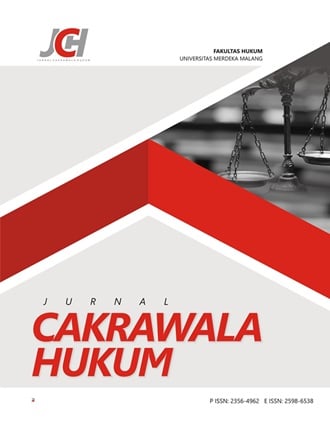Recognition of Customary Law in the National Criminal System: a Holistic Approach
DOI:
https://doi.org/10.26905/idjch.v15i3.14721Keywords:
Integral Approach, Customary Law, National Criminal System.Abstract
This paper is prepared to focus on the problem of an integral approach to the recognition of customary law in the national punishment system. The analysis results in a policy approach that states that the purpose of punishment is no longer retaliation against the perpetrator but is more oriented towards the goal of preventing people from committing crimes again. In addition, it is also seen that punishment is carried out with the aim of resolving conflicts that arise, restoring social balance, and creating a sense of peace. This conscious and deliberate policy is based on the basic idea of balance, including a mono-dualistic balance between the interests of society and the interests of individuals. The formulated idea of balance is a form of recognition of customary law. The value approach is carried out by formulating the objectives of customary law punishment crystallized in Pancasila, including restoring balance in society, both spiritual balance and balance of social relations. This is very relevant to the balance between religious values, human values, and societal values in the five precepts of Pancasila.
Downloads
References
Abdullah, Rahmat Hi. 2016. “Urgensi Hukum Adat Dalam Pembaharuan Hukum Pidana Nasional”. Fiat Justisia: Jurnal Ilmu Hukum 9 (2). DOI: https://doi.org/10.25041/fiatjustisia.v9no2.595.
Adiasih, Ning, and Mulya Sarmono. “Overview Pluralism Law: Application Ammatoa Customary Crime Kajang, Bulukumba, South Sulawesi After the New Criminal Code Law”. Revista De Gestão Social E Ambiental 18 (6). São Paulo (SP):e05864. 2024. DOI: https://doi.org/10.24857/rgsa.v18n6-059.
Arief, Barda Nawawi, “Bunga Rampai Kebijakan Hukum Pidana Perkembangan Penyusunan Konsep KUHP Baru.” Jakarta: Kencana, 2010.
Arief, Barda Nawawi, “Ilmu Hukum Pidana Integralistik (Pemikiran Integratif Dalam Hukum Pidana).” Semarang: Penerbit Pustaka Magister, 2015.
Arief, Barda Nawawi, ”Kebijakan Legislatif Dalam Penganggulangan Kejahatan Dengan Pidana Penjara.” Cetakan Keempat. Yogyakarta: Genta Publishing, 2010.
Atmasasmita, Romli. ”Rekonstruksi Asas Tiada Pidana Tanpa Kesalahan “Geen Straf Zonder Schuld.” Jakarta: Gramedia Pustaka Utama, 2017.
Huda, Ni,matul. ”Politik Hukum dan Pembangunan Sistem Hukum Nasional. ”Jakarta: Sinar Grafika, 2023.
Irmawanti, Noveria Devy & Barda Nawawi Arief. “Urgensi Tujuan dan Pedoman Pemidanaan Dalam Rangka Pembaharuan Sistem Pemidanaan Hukum Pidana”, Jurnal Pembangunan Hukum Indonesia, Nomor 2, (2021): 219, DOI: https://doi.org/10.14710/jphi.v3i2.217-227.
Jaya, Nyoman Sarikat Putra. “Hukum (Sanksi) Pidana Adat Dalam Pembaharuan Hukum Pidana Nasional”, Masalah-Masalah Hukum 45, No. 2 (2016): 123-124, DOI: https://doi.org/10.14710/mmh.45.2.2016.123-130.
Kurniawan, Fery. “Hukum Pidana Adat Sebagai Pembaharuan Hukum Pidana Nasional”, EDUKA: Jurnal Pendidikan, Hukum dan Bisnis 1, Nomor 2 (2016): 27. https://doi.org/10.32493/eduka.v1i2.3739
Kusumaatmadja, Mochtar dan B. Arief Sidharta. ”Pengantar Ilmu Hukum: Suatu Pengenalan Pertama Ruang Lingkup Berlakunya Ilmu Hukum.” Bandung: Alumni, 2000.
Manan, Bagir. “Peranana Hukum dalam Mewujudkan Cita-Cita Keadilan Sosial Menurut UUD 1945”, Makalah Dies Natalis FH Universitas Katolik Parahyangan, Bandung, 21 September 2013.
Osman, F. “The Consequences of the Statutory Regulation of Customary Law: An Examination of the South African Customary Law of Succession and Marriage.” Potchefstroom Electronic Law Journal, 22, (2019). 1-24. https://doi.org/10.17159/1727-3781/2019/v22i0a7592.
Ranteallo, Jenri and Yana Sukma Permana. “Tinjauan Yuridis Tindak Pidana Penyerobotan Tanah Adat di Kabupaten Toraja Utara”. The Juris 6 (2), 2022: 437-40. DOI: https://doi.org/10.56301/juris.v6i2.614.
Rozah, Umi. “Environmental Maintenance through the Application of Adat (Criminal) Sanctions on baduy Cummunities”, Indian Journal of Forensic Medicine & Toxicology 15 No. 2 (2021): 1206-1213, https://doi.org/10.37506/ijfmt.v15i2.14485
Rozah, Umi. “Membangun Asas-Asas Pemidanaan Dalam Kerangka Pancasila”. Ringkasan Disertasi Program Doktor Ilmu Hukum Universitas Diponegoro, 2015.
Sakidjo, Aruan & Bambang Poernomo, “Seri Hukum Pidana 1: Hukum Pidana Dasar Aturan Umum Hukum Pidana Kodifikasi.” Jakarta: Ghalia Indonesia, 1990.
Syaufi, Ahmad, Aurora Fatimatuz Zahra, and Mursidah. “The Existence of Customary Law: Badamai Customary Law”. Research Horizon 1 (3) 2021.:94-99. https://doi.org/10.54518/rh.1.3.2021.94-99.
Sudarto. “Hukum dan Hukum Pidana.” Bandung: Penerbit Alumni, 1986.
Undang-Undang Nomor 1 Tahun 2023 tentang Kitab Undang-Undang Hukum Pidana, Lembaran Negara Republik Indonesia Tahun 2023 Nomor 1, Tambahan Lembaran Negara Republik Indonesia Nomor 6842.
Yogaswara, Yanuardi. Tata Surwita, and Dewi Asri Yustia. “Implikasi Penerapan Hukum Pidana Adat Dalam Pasal 2 KUHP Terhadap Asas Legalitas Dalam Sistem Hukum Pidana Indonesia”. El-Mujtama: Jurnal Pengabdian Masyarakat 4 (3) 2024: 1736–1744. DOI: https://doi.org/10.47467/elmujtama.v4i3.2191.
Yoserwan. “Implications of Adat Criminal Law Incorporation into the New Indonesian Criminal Code: Strengthening or Weakening?” Cogent Social Sciences 10 (1). 2023. DOI: https://doi.org/10.1080/23311886.2023.2289599.
Additional Files
Published
How to Cite
Issue
Section
License
Copyright (c) 2024 Jurnal Cakrawala Hukum

This work is licensed under a Creative Commons Attribution-ShareAlike 4.0 International License.
Authors who publish in this journal agree to the following terms:
The copyright of the received article shall be assigned to the journal as the publisher of the journal. The intended copyright includes the right to publish the article in various forms (including reprints). The journal maintains the publishing rights to the published articles. Authors must agree to the copyright transfer agreement by checking the Copyright Notice column at the initial stage when submitting the article.










